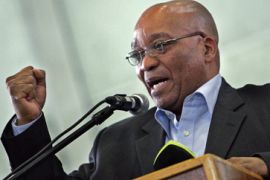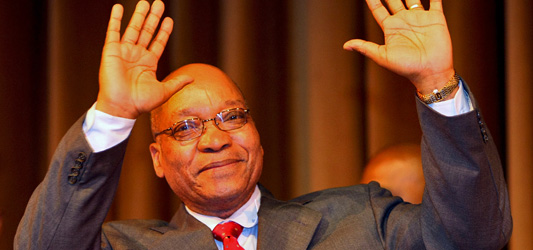Court papers filed against Zuma
New evidence in South African corruption case involving ANC deputy president.

 |
| Jacob Zuma is currently the frontrunner to lead the ANC after branch nominations [EPA] |
Documents containing new evidence against Jacob Zuma, the deputy president of South Africa’s ruling African National Congress (ANC), in a corruption case have been filed by legal authorities.
The move comes days before Zuma is expected to be elected as the new leader of ANC at their national conference between December 16-20.
An affidavit was filed by South Africa’s directorate of special operations on Saturday.
It contains what it calls substantial new evidence that Zuma had received larger payments in a corruption case than originally thought.
“The extent and gravity of the charges has grown…,” said the affidavit, which was a response to an appeal by Zuma.
“The payments based on the old and the new evidence are therefore more than three times greater than those based on the old evidence alone.”
Any charging of Zuma could lead to his jailing before being sworn in as ANC president.
Zuma said that he would not step down as ANC president unless he is found guilty in court, were he to be elected in a vote expected on Monday.
Harmful infighting
Meanwhile, Thabo Mbeki, the South African president, has said that the acrimonious contest to lead the ANC could destroy the party.
Mbeki, who has been president since 1999, is seeking a third term as the party’s president against Zuma in a contest that has been dominated by personality clashes rather than policies.
|
“If division leads to retribution, that’s what will destroy the ANC” Thabo Mbeki |
“If division leads to retribution, that’s what will destroy the ANC… Part of our responsibility is to avoid such an outcome,” Mbeki told the Mail & Guardian newspaper on Friday.
Given the party’s electoral dominance, whoever is selected as leader would be virtually assured of winning the presidency in the next vote scheduled for 2009.
Zuma is the frontrunner after taking about 60 per cent of the votes in ANC branch nominations.
Fraught relations
The relationship between the two men is fraught and has led to a split in the party.
Zuma was chosen by Mbeki as deputy president in 1999, but was fired by his party leader after Zuma’s financial adviser was convicted of fraud and bribery in June 2005.
“We must take this thing away from personalities – the masses of our people are not in the least interested in who dances best,” Mbeki said.
Zuma is a controversial figure. He was acquitted of rape last year, in addition to the fraud and corruption charges looming over him.
Despite this, Zuma remains popular as a defender of the poor, contrasting to what some see as the aloof and intellectual Mbeki.
Were Mbeki to be elected he would be constitutionally barred from standing for a third term as the country’s president, but will be able to influence who becomes the ANC’s presidential candidate, most likely by selecting his deputy-president.
Policy consistency
Professor Adam Habib, a political analyst at the University of Johannesburg, says that many of the cited differences between a Zuma and Mbeki leadership may not materialise.
“I don’t think there would be a fundamental change of policy, if either were elected,” Habib said.
“South Africa’s macro-economic policy has already changed over the last three or four years. We no longer talk about privatisation. We have a state-led industrialisation drive. We have a huge number of people on social support grants.
“What we are likely to see is changes in policy that are in line with what has been happening over the last three or four years.”
Were Zuma to win, Habib sees Mbeki as having to step down and ask the national legislature to choose a president from their own ranks or call early presidential elections.
If Mbeki wins, Habib says that power is likely to continue to be centralised but it will be contested more vigorously, as has happened recently with increasing opposition to Mbeki’s consolidation of power in his national administration.
Nelson Mandela’s former wife, Winnie Madikizela-Mandela, has offered a compromise proposal to ease factionalism under which Mbeki would stay on as ANC leader and then Zuma appointed as the ANC candidate for the country’s presidency in 2009.
Zuma’s secretary, Nontokozo Luthuli, said Madikizela-Mandela held discussions with Zuma on Friday, but did not elaborate. SABC radio said she was also expected to hold talks with Mbeki. An ANC spokesman could not confirm those talks were scheduled.